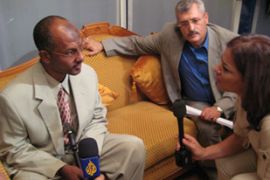Freed Sami al-Hajj returns to Doha
Al Jazeera cameraman who spent six years in Guantanamo is given rousing reception.

Al-Hajj later addressed around 200 people gathered at the airport grounds to celebrate his return with balloons and white doves.
| In depth | |
Profile: Sami al-Hajj Video: Al-Hajj returns to Doha Pictures: Hero’s welcome for al-Hajj |
“Six years and seven months were stolen from my life in Guantanamo camp under torture and inhuman treatment by those who call themselves a democratic people,” al-Hajj said.
“This captivity has made me more steadfast in defending the values of truth and righteousness because people deserve to live with dignity.
“We are all attached to the principles of freedom and peace. These are human principle and values that are dictated by international law by religious values and by principle all over the world.”
Asserting that “being a journalist is not a crime”, al-Hajj said he would return to work at Al Jazeera, though Khanfar said in what role that would be is still being discussed.
Al-Hajj said he has no problems with Americans and several of the guards at Guantanamo Bay became his friends.
“It has been more than 2,500 days that I had been dreaming of this moment,” al-Hajj said.
Al-Hajj was later driven to the Al Jazeera network’s compound for a company reception, Chatriwala said.
US imprisonment
 |
| Al-Hajj was welcomed by Khanfar and other senior Al Jazeera staff [Omar Chatriwala] |
After years of international outcry, al-Hajj was released to Khartoum, the capital of Sudan, his native country, from Guantanamo Bay on May 2.
The ceremony was attended among others by Mustafa Osman Ismail, adviser to Omar Hassan Bashir, the Sudanese president, and Khanfar.
This included US troops tearing and desecrating the Quran.
He said that soldiers forced detainees in the camp to break Islamic fasts and often assaulted them.
Interrogation sessions
Al-Hajj said he was subjected to 130 interrogation sessions, 95 of them to probe the professional work he did for Al Jazeera.
He accused the US administration of pressuring him to “betray” his profession and work as a spy.
During his imprisonment, al-Hajj went on hunger strike for nearly 16 months to protest against his detention without trial and the treatment of the camp’s detainees.
The US administration denies any torture charges and has said that it doubts al-Hajj’s credibility.
Guantanamo Bay has been run by the US as a detention centre for “enemy combatants” and those considered a security threat since 2002.
Although more than 500 prisoners have been released from the camp, about 250 people still remain at the detention facility.
